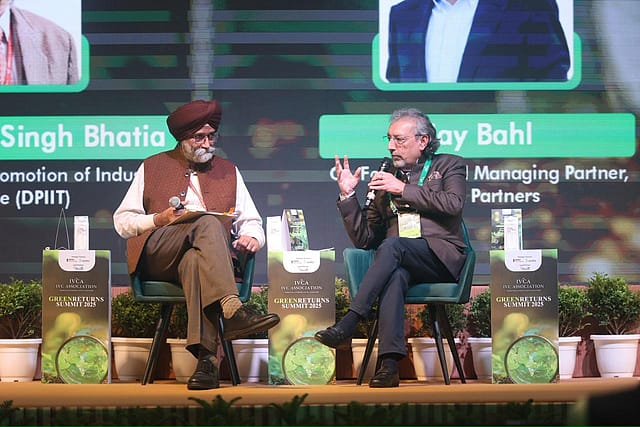IVCA GreenReturns Summit: DPIIT Secy pushes clean-tech integration; ex-G20 Sherpa says India poised for global leadership
ADVERTISEMENT

India's climate strategy was the main highlight of the Indian Venture and Alternative Capital Association’s (IVCA) GreenReturns Summit 2025 in New Delhi on Monday. On Day 1, DPIIT Secretary Amardeep Singh Bhatia talked about the country's next phase of climate action. In a fireside chat with Ajay Bahl of AZB & Partners, he said India is moving towards building sector-wide climate integration, scaling clean technologies, and strengthening regulatory frameworks. Former G20 Sherpa Amitabh Kant said India has the opportunity to become the world leader in climate action.
Bhatia spoke about how India has made significant progress on its climate commitments over the past decade while balancing economic growth and sustainability. He said India is now focusing on the next phase—integrating climate action across sectors, scaling clean technologies, and strengthening the regulatory environment to accelerate green investments. “Over the past decade, India has steadily advanced its climate goals without losing sight of the country’s growth priorities. The task before us now is more complex and more consequential—embedding clean technologies across value chains, steering industry towards sustainable production models, and putting in place policy frameworks that give long-term clarity to investors,” said Bhatia.
He said by strengthening enablers such as battery storage, manufacturing capabilities, and market-driven solutions, the country aims to ensure that India’s climate ambitions translate into measurable impact on the ground.
January 2026
Netflix, which has been in India for a decade, has successfully struck a balance between high-class premium content and pricing that attracts a range of customers. Find out how the U.S. streaming giant evolved in India, plus an exclusive interview with CEO Ted Sarandos. Also read about the Best Investments for 2026, and how rising growth and easing inflation will come in handy for finance minister Nirmala Sitharaman as she prepares Budget 2026.
He also emphasised the critical role of manufacturing competitiveness, green supply chains, and emerging technologies in achieving India’s climate milestones. Bhatia noted that India’s climate strategy is anchored in enabling industries to transition sustainably, promoting innovation, and ensuring that policy frameworks support both environmental outcomes and economic growth.
At the IVCA GreenReturns Summit 2025, Kant said by combining policy, technology, and private-sector finance, India is creating a green energy ecosystem that is both scalable and cost-effective. “From 256 gigawatts of renewable energy to 24×7 storage and green hydrogen, India is proving that sustainable growth can be achieved while driving economic progress,” said Kant.
Kant also said that India is demonstrating that private-sector-led initiatives, backed by clear policy frameworks and financial surety, can accelerate renewable energy adoption. “Our integrated approach—from green corridors to digitalised transmission grids—ensures energy reaches every part of the country efficiently. And by leveraging innovation and global capital, India is setting benchmarks in clean energy that the world can follow.”
